Building Local Chapters
The Autism Society Philippines (ASP) has grown from the 11 mothers who bonded together for the causes of their children in 1989 to nearly 13,000 members, with 97 chapters all over the country.

Leading in Autism Advocacy
The Autism Society Philippines (ASP) increases public awareness about challenges faced by Filipinos on the spectrum, advocating for appropriate services, and providing the latest information regarding intervention, education, and advocacy. It is comprised of persons with autism, families, teachers, and educators whose lives have been touched by autism.
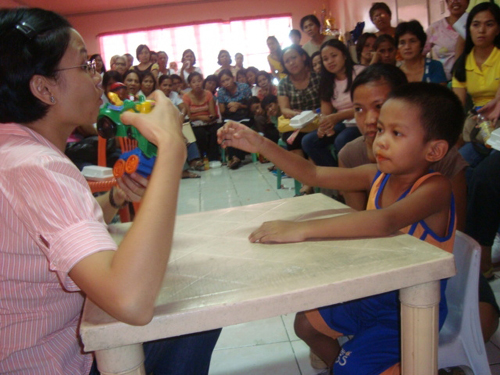
Speaking in Unison
The Autism Society Philippines (ASP) reaches out to the many communities across the islands to organize and help make available services and support to persons with autism and their families, in close coordination with government agencies, local government units, and community builders. Our chapters remain to be driving force behind the organization's meteoric growth.
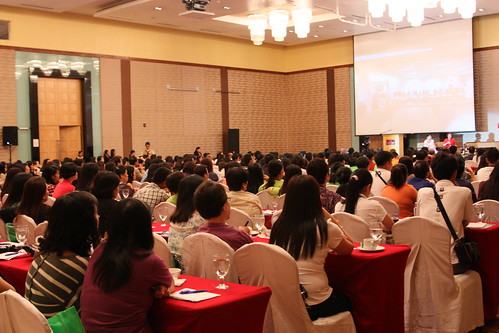
30 July 2013
Making Friends
27 July 2013
ASP joins Manila Zoo 54th anniversary
 |
| ASP Family in Manila Zoo |
The Manila Zoo has hosted many PWD events and has brought happiness to many children with disabilities. Despite the ongoing global campaign to transport Maali, the elephant, back to Sri Lanka by the international organization PETA, the news that “Maali will stay” brought smiles to the children present at the anniversary. Manila Mayor Joseph Estrada reiterated that he will not allow the aging Maali to be transferred to a sanctuary in Thailand. In his speech that was read by Vice Mayor Francisco “Isko” Moreno, Estrada said that “nothing can match the smiles and joys brought to us by animals like lions, tigers, deers, and Maali, the famous elephant.”
25 July 2013
Autism at Diet, Meron Bang Konek?
 |
| Ms. Felisa Mendiola |
24 July 2013
ASP Bulacan Chapters co-host NDPR Events in Malolos
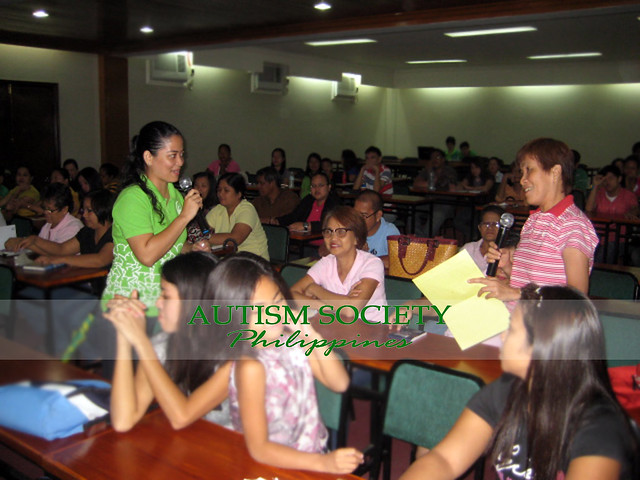 |
| Q&A of orientation seminar |
ASP President Ms. Mary Janette Peňa, ASP San Jose del Monte leader Teacher Tina Borneo and
ASP Hagonoy Chapter Pres Dr. Anawi Tolentino hosted a day-long orientation seminar on autism, the UNCRPD and the parent advocacy for CWD for the PWD Federation officers from the different towns in Bulacan, AKAPIN officers, parents, teachers and the staff from the Provincial Social Welfare Office with their PDAO Focal Person Ms. Pacencia Morada. The ASP Chapters of Bulacan are one with the nation in the celebration of National Disaster Prevention and Rehabilitation Week.
23 July 2013
Autism in ASEAN: Unity in Diversity
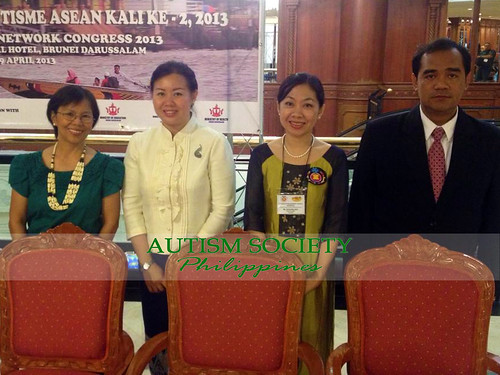 |
| Cecile Sicam with foreign officers |
The 2nd AAN Congress in Brunei in April 2013 was an eye-opening experience for me. I learned about the status and activities of each country as each delegation gave a report during the formal meetings. But it was during meal times, breaks and field trips that we had the opportunity to share stories in more informal and personal level. Through these interactions I realized how unique each country’s situation is but that we are all bound by the same challenges autism brings.
21 July 2013
ASP Diliman Lectures on the Rights of PWDs
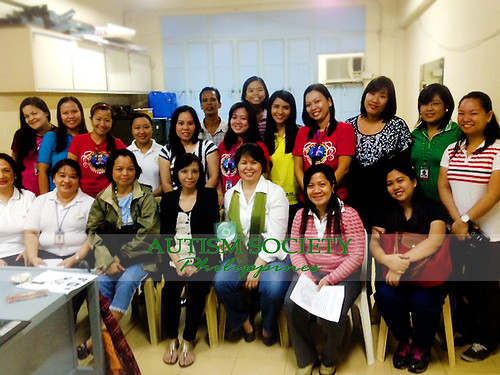 |
| SpEd Educators of New Era College and ASPs Jo Palomares |
Josephine Palomares gave the lecture to around 18 teachers of the SPED Department, using the CD “Educating Children with Disabilities using the Digital Talking Books.” The CD is a project of ASP funded by Australian Aid. It teaches the three basic rights of the child via learning stories using the DAISY format that runs on AMIS platform.
16 July 2013
Harping on Christian’s music
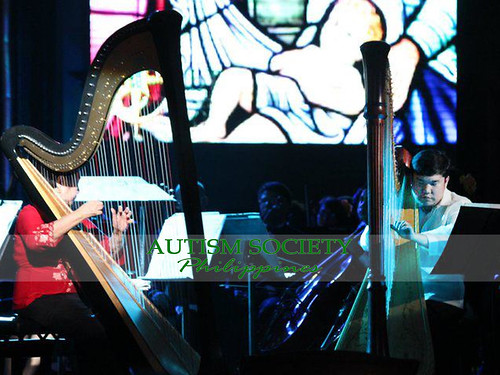 |
| Christian performs with Prof. Lourdes Gregorio at the UST Christmas Gala in 2010. |
By: Dang U. Koe, ASP Chair Emeritus
Christian was also fortunate to complete his elementary and secondary education in a school that integrates special needs students in its regular classes. His school, The Community of Learners, gave Christian opportunities to display his musical talents, including playing the harp during his high school graduation ceremony at the Kalayaan Hall of Club Filipino.
15 July 2013
SJDM Ignites the Light
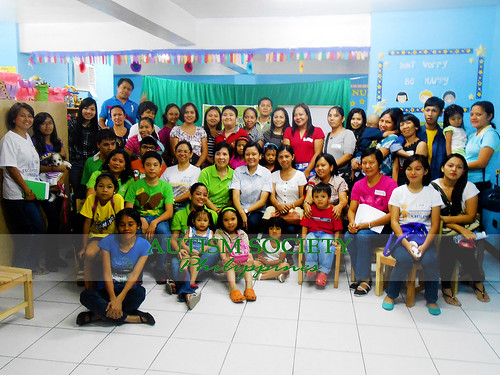 |
| ASP family, teachers and friends group |
The San Jose Del Monte Chapter of the Autism Society Philippines was privileged to host "Filipino Siblings of PWA's: Understanding and Responding to Their Needs" last 01 June 2013 at the Happy Child Academy.
14 July 2013
ASP contributes to the Legislative Agenda for Children
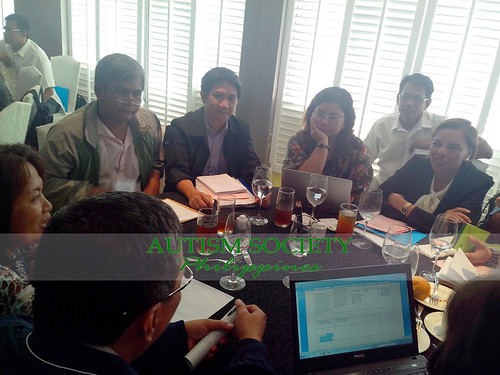 |
| Ranilo Sorongon meeting with different Congress people |
13 July 2013
Family Support Group in Alfonso, Cavite
 |
| Ms. Janette Peña with son Muneer |
Time: 8:00am-12nn
Venue: Alfonso Chapter Sped Center, 082 Matagbak, Alfonso Cavite City
Please contact: Ms. Jeanette S. Vidallon at +63908 404-7350 or jeanettevidallon@yahoo.com.ph
12 July 2013
Opening doors to collegiate life
Last July 4, the Olivarez College auditorium was full of students, teachers, nuns and medical professionals eager to learn about autism. The Autism Society Metro South Chapter headed by Mrs. Imee Alviso and Mrs. Ditas Granada were present to show their support. Mrs. Gina Bermudo, ASP Board of Trustee, was invited to be the resource speaker. As always, Mrs. Bermudo gave a very powerful presentation where she conducted the seminar with much energy and credibility. After the very informative seminar, an immediate second seminar was requested to which Mrs. Bermudo graciously agreed. She warmly touched the audience's hearts by telling actual stories of how persons with autism and their families are coping up with the challenges of living with autism. Emotions overflowed at the conference room. As a result, the attendees promised to spread the message of autism acceptance and inclusion, individually and collectively.
10 July 2013
National Disability Prevention Week 2013
 |
| NCDA Logo |
Walk for Justice
Thanksgiving and Holy Mass celebration
Launching of the Sensitivity Training for Prosecutors
Legal Clinic by the Quezon City Public Attorneys Office
Diagnosis of children who are suspected with developmental disability and other disability
PWD Product Conference
Poster Making Contest for Children with Disabilities
Forum for Parents with Children with Disabilities
Forum on Access to Justice of Children with Disabilities
Fun Day for children with disabilities
PARM M.O.V.E. Manila
09 July 2013
Seminar: All you need to know about autism
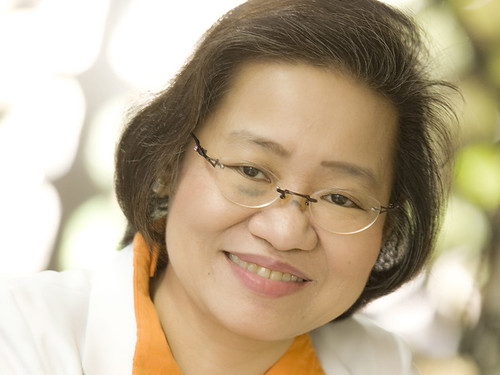 |
| Dr. Alexis Reyes |
28 July 2013, Sunday, 9:00AM- 12:00NN
Seminar Fee is inclusive of certificate, handouts and snack.
Pre-registration fee is P500 (up to July 22).
On-site registration fee is P600.
ASP Members get a discount of P100.
Register on-line today!
03 July 2013
ASP Family Support Group for July 2013
 |
| Ms. Evelyn Go with son Gelo |
Time: 1:00-5:00PM
Venue: ASP Office, Room 307, ML Bldg., # 47 Kamias Road, Quezon City
 Posted in: fsg
Posted in: fsgASP joins Freedom Walk for PWDs
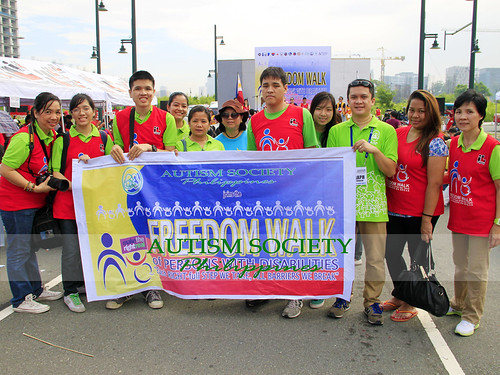 |
| Janette Peña, Raphael Torralba other leaders and members in Freedom Walk |
02 July 2013
Dining out
I remember a story that’s often been told by my father whenever he talks about his experiences in raising a child with autism. He took my brother, then 6 years old, out to eat at a fast food. As they were walking to their table, my brother grabbed pieces of french fries from another table. My father, aside from apologizing to the surprised diners, explained that my brother has autism. Fortunately, the diners just laughed the incident off. I guess it helped that my brother was a cute kid.
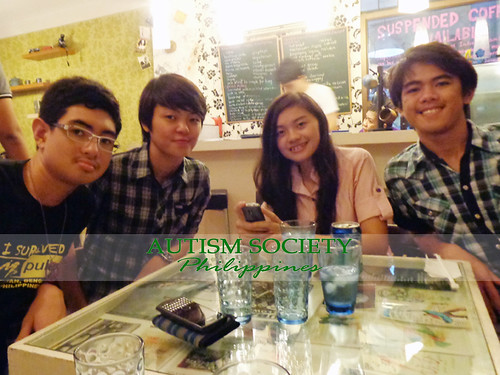 |
| PWA Vinz (left) dines out with his siblings. |
1. Do advanced research. If your child is a picky eater or follows a restricted diet, it is helpful to look for the menu of the restaurant ahead of time. It also helps to bring your own food just in case. Check the peak hours of the restaurant to avoid big crowds. Check customer reviews — it will give you an idea how attentive and efficient the staff will be to your child. Do they play loud music? Is the service fast? Are the staff friendly?
 Posted in: angels-talk
Posted in: angels-talkNew Office Hours for ASP National
 |
| ASP Logo |
The office of Autism Society Philippines National at Room 307, ML Building, 47 Kamias Road, Quezon City, will now be open from 8:00 am to 5:00pm, from Tuesday to Saturday, beginning the week of 01 July 2013.
 Posted in: community
Posted in: community




